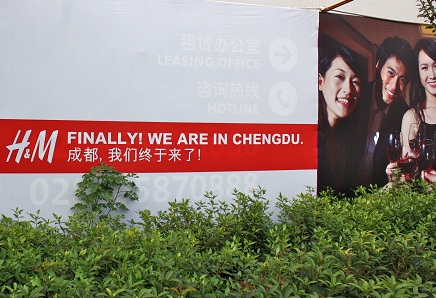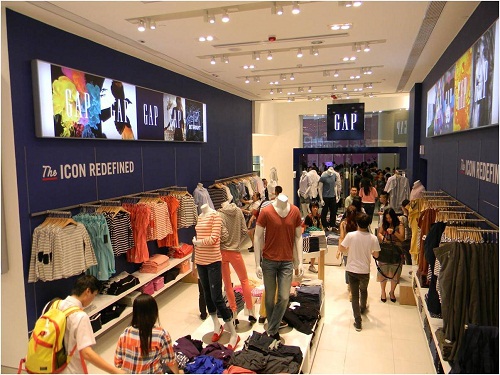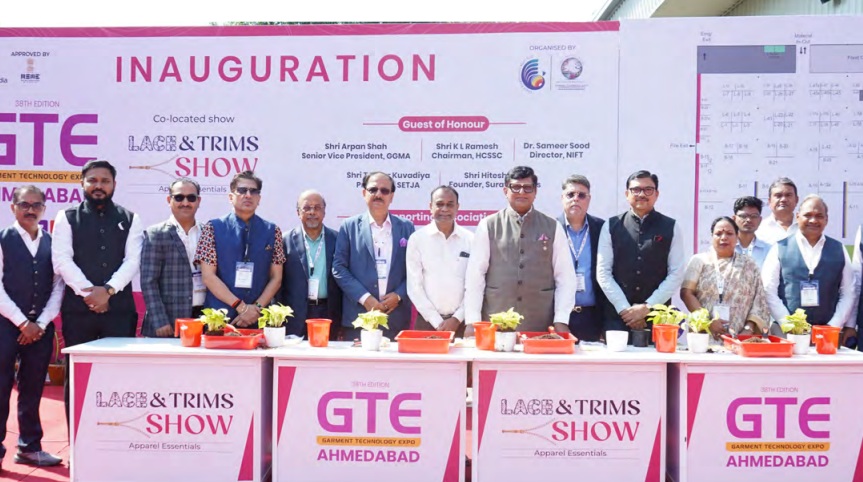FW
The 28 countries that comprise the European Union have unanimously voted to expand an existing ban on a common chemical used in cleaning, dyeing and rinsing textiles. The EU banned the use of nonylphenol ethoxylates (NPE) in textile manufacturing more than 10 years ago, but the latest move expands the prohibition to include clothing imported by member states.
The decision was based on reports that found the chemical enters water supplies during washing, where it disrupts hormones in fish and impacts their fertility and development. The new restriction will not apply to second-hand goods or recycled textiles because it is assumed these have already been washed several times and so will contain negligible amounts of NPE. However, a number of apparel and textile companies feel compliance with the new restriction will be difficult because NPE is present everywhere in the supply chain and has numerous uses.
NPE is used in textile manufacture as a cleaning, dyeing and rinsing agent. This toxic chemical remains in the garment, released once clothes are washed, breaking down to form toxic nonylphenol. Nonylphenol is a persistent chemical with hormone-disrupting properties that builds up in the food chain and is hazardous even at very low levels.
England will host Textile Forum from October 14 to 15, 2015. This will be the biggest exhibition since the first event 13 years ago. While the event has traditionally focused on women’s wear fabrics, especially those for occasion and bridal wear, this session will have a bigger selection of fabrics for men’s outer wear and daywear.
So there will be top British wools and tweeds, laces and silks, fine cottons and leathers with a sprinkling of buttons, linings and labels. Hantex will exhibit a range of jersey, baby cord, canvas and batiks, A-Tex, a leading global provider of brand identity products, will offer packaging solutions, hang tags, labels and in-store visual merchandising. Acorn and Ringhart will present quality shirtings. The Wool Lab, which collaborates with the world’s most innovative and quality-oriented spinners and weavers, will showcase samples of fabrics in line with leading fashion and textile trends.
Cotton prints will be displayed at Anbo and Makower. Also on display will be top silk companies James Hare, Bennett Silks, Henry Bertrand and Pongees; fancy fabric specialists Laurent Garigue and bridalwear experts Michael’s Bridalwear and Platinum Bridal Fabrics. Textile Forum will expand this autumn to provide more sourcing options for designers looking for luxury fabrics. And fabrics there will be in a huge array.
www.textileforum.org.uk/
To highlight various problem faced by the textile players in Pakistan, All Pakistan Textile Mills Association (APTMA) has presented a nine-point proposal to the Federal Textile Board. Pakistan’s textile exports that peaked at $13.8 billion in 2011, have stagnated ever since. For the recently ended fiscal year, all textile items other than cotton yarn and knitwear, which were up by 11 and 8 per cent, respectively have sharply declined year-on-year in terms of volume exported – cotton cloth by 28 per cent; bed wear by 28 per cent; towels by 16 per cent; readymade garments by 23 per cent; tents, canvas and tarpaulins by 53 per cent, and artificial silk and synthetics by 64 per cent.
APTMA estimates that these potential exports could have amounted to around $3.5 billion, one-fourth of textile exports and over 14 per cent of total annual exports. It added that 30 per cent production capacity of spinning mills is currently impaired due to the lack of energy and high cost of operating in this country.
Moreover, Pakistan’s share in the global textile and cotton market fell from 2.2 per cent in 2006 to 1.8 per cent as of 2013. Meanwhile, over the same period competing countries: China, India, and Bangladesh witnessed an increase from 27 per cent, 3.4 per cent, and 1.9 per cent to 37 per cent, 4.7 per cent, and 3.3 per cent, respectively. And it warned that if the growth factors stay constant in these countries, Pakistan’s share will decline to 1.5 per cent by 2020.
APTMA’s nine point proposal includes withdrawal of various surcharges on electricity, withdrawal of GIDC and the recent hike in gas tariff, zero-rating to textile industry, long-term finance for ginning and spinning sector, export re-finance to spinning and weaving sectors, five per cent export incentive for capturing non-traditional markets, a uniform tax rate of three per cent on the whole textile value chain, cracking down on dumping and smuggling, and immediate release of the pending payments.
www.aptma.org.pk
A report by the Centre for Monitoring Indian Economy (CMIE) says, cloth industry in India has seen healthy growth in revenues during the June 2015 quarter. Aggregate net sales of the 54 companies that reported their interim results grew by eight per cent year-on-year during the period. The growth in sales was broad-based with 36 companies registering higher sales.
During the quarter under review, revenues of Indo Count Industries and Mafatlal Industries surged by 45.9 per cent and 59.3 per cent, respectively. Indo Count Industries’ increase in revenues was attributed to a robust growth in home textiles. Sales of home textiles grew 80 per cent solely driven by a rise in volumes. However, the company’s yarn segment revenues fell by 10 per cent due to decline in realisations.
Net sales of other companies such as Bombay Rayon Fashions, Mandhana Industries, Jindal Worldwide, Aarvee Denim & Exports and K G Denim grew in the range of 10-25 per cent. Revenues of Richa Industries and Sunil Industries grew more than two-fold. However, revenues of Arvind increased by a mere 2.6 per cent during the quarter. The company’s denim and woven fabric segments, which together account for more than 75 per cent of the total revenues, reported a feeble sales performance. Woven fabric segment revenues grew by a mere 0.6 per cent, while denim fabric segment revenues fell by 1.4 per cent. Nonetheless, a 34 per cent increase in garment sales and 17.5 per cent rise in knitted fabric sales boosted the overall revenues of the company.
Operating profit of the industry increased by a robust 36.8 per cent in the quarter and operating margin increased by 280 basis points to 13.2 per cent. Indo Count Industries’ net profit grew more than two-fold and of Jindal Worldwide, Nandan Denim and Mafatlal Industries surged by 28.7 per cent, 40.7 per cent and 68.2 per cent, respectively. Bombay Rayon Fashions posted a profit worth 1.5 per cent of its total income as compared to a loss equivalent to 4.8 per cent in the year-ago quarter.
www.cmie.com
Tirupur exporters body Tirupur Exporters Association (TEA) has said shipment of knitwear from the region have grown to Rs 20,730 crores in 2014-15 and is expected to touch the target of Rs 36,000 crores by 2016-17. At the 25th Annual General Meeting of TEA, President A Shaktivel said input factors were more or less favourable, which helped them to clock 15 per cent growth compared with 2013-14 financial year. At the moment, all-India market share of Tirupur in knitwear exports is 44.29 per cent. This figure would go up once the industry starts exporting synthetic-based garments, which have a market throughout the year globally, he added.
Backed by favourable cotton yarn prices, knitwear exports from Tirupur increased to Rs 20,730 crores up from Rs 18,000 crores in 2013-14; a growth of 15.52 per cent in rupee terms and 15.94 per cent in terms of foreign currency. The total readymade garment exports from India, for the first time crossed the Rs one lakh crore-mark in 2014-15 to touch Rs 1.03 lakh crores. Of this, knitwear exports were Rs 46,801 crores, with a share of 45.43 per cent, informed Shaktivel.
While expressing concern over the delay in proposed Free Trade Agreement with the EU, Shaktivel said that the Comprehensive Economic Partnership Agreement with Canada and Australia should happen before end of 2015 to increase exports to these countries.
www.tea-india.org

Fashion-consciousness on the rise
China has seen quick expansion of big brand names led by a sudden rise in fashion-conscious among consumers and the weak performances of world’s largest fashion retailers in their home markets in the US and Europe.
Though growing rapidly, the Chinese market is still at an early stage of expansion offering attractive opportunities for foreign apparel brands. As Magnus Olsson, Country Manager at H&M AB points out this year, China and the US would once again be their biggest expansion markets.
COS (short for Collection of Style), a high-end brand from Stockholm-based H&M is also on an expansion spree in several locations including a new store in the commercial area of Sanlitun in Beijing. Nearly 400 new stores are planned by H&M across the world, US and China would be hosting the highest number of these store. H&M entered the Chinese market in 2007 and opened 69 stores in 2014, totaling to 271.
GAP Inc, the San Francisco-based company, is focusing on the global market, particularly China. This way, the brand would reduce its dependence on North America, where it is struggling to win back consumers. GAP revealed that they would open new stores in Asia with a focus on GAP China, Old Navy China, and Old Navy Japan this year. As Susan Anderson, a senior research analyst at FBR Capital Markets & Co, observes the brand would open 115 stores in 2015, with a focus on China, sports brand Athleta, and Global GAP outlets.
China is also the second-largest market after Spain for Inditex, owners of Zara. Paul Rossington, consumer and retail analyst at global lender HSBC Plc, stated that China accounts for about 40 per cent of Inditex new store openings over the last couple of years.
Expansion still at a nascent stage
Even though China is gaining importance and becoming a top priority for fashion retailers, it is still far away from becoming their first source of revenue. Rossington says Inditex and H&M China represent just a limited percentage of their total global sales and until June this year, Inditex had derived about eight per cent and H&M, about five per cent form China. Thus, this shows that there is ample space for gains in the Chinese markets.
Many of their clients were looking at more investment in China, says Jessie Qian, Partner and Head of consumer markets at KPMG China as they were expecting a middle-class income to increase in the next four-five years. Besides, their flexible approach to online shopping has been crucial for success. Moreover, the expansion of brick-and-mortar stores, have been crucial to build brand awareness. However, this has not been enough to satisfy the huge demand for affordable fashion.
Qian says that as far as the retail industry in China is concerned, one can see that physical outlets may grow in single digits every year. However, e-commerce outpaces that growth, almost doubling the number.
A whitefly pest attack has caused massive damage to cotton crop both in Punjab and Haryana with farmers fearing considerable loss in kharif crop. Both states have asked growers to take remedial steps to prevent damage. The whitefly infestation has come as a major blow to farmers at a time when they had already faced huge financial losses when their wheat crop got damaged due to inclement weather conditions early this year.
The whitefly attack has even assumed political overtones as the Opposition has sought a CBI probe into the purchase of spurious insecticides for cotton crop, leading to heavy losses to growers. About 20 to 25 per cent of the cotton crop in Punjab is under the grip of whitefly attack. Surveys have been launched to assess the damage to crop. The total area under cotton in Punjab is about 4.50 lakh hectares. In some areas, the attack of whitefly was so severe that farmers were forced to uproot their crop. The last time such an attack was seen in 1977. Haryana is facing a 25 per cent loss and 4.47 lakh hectares of cotton area have been affected.
A textile processing park is coming up in Tamil Nadu for small and medium-scale units. About 50 small and medium units in Salem, Karur, Erode, Tirupur, Coimbatore and Madurai will benefit from the park when it is developed. The state government will extend a 25 per cent capital subsidy while the Union government will give 50 per cent subsidy.
The project was mooted in 2007 and is coming up on 260 acres. Coming up at a total project cost of Rs 500 crores, it will have 10 processing units that will have the capacity to process 200 tons of fabric (knitted and woven) and yarn. Another textile processing park will also come up in Tamil Nadu for larger textile processing units. An advisory committee will be formed for the textile sector in Tamil Nadu. It will play greater role in laying the road map for sustained growth of the textile industry in the state and make it a hub for textile manufacturing.
Tamil Nadu has announced a 15 per cent discount for silk fabric sales. The industry in Tamil Nadu is waiting for a textile policy, which will add to the growth impetus and act as a spur to export performance.
Bangladesh's garment exporters say the country’s interest rates are high compared to India, Pakistan, Vietnam and Indonesia. They want the government to reduce the rate as exporters see it as an impediment to growth. They say if this is not done, the industry would not grow at the expected level and the target of reaching exports of $50 billion by 2021 will be tough to achieve. Another of their peeves is that the US has suspended GSP facility for Bangladesh. They want the facility restored.
Bangladesh is the world’s second largest garment exporter. The garment industry now accounts for nearly 82 per cent of Bangladesh’s total exports. In the last 40 years since independence, poverty rate has fallen from 80 per cent to less than 30 per cent, GDP has averaged around five to six per cent for over 20 years, and the garment industry has had a lot to do with all this. It has transformed the economic and social landscape of the country.
When the Rana Plaza garment factory collapsed in 2013, a harsh spotlight suddenly shone on the country’s garment industry. That spotlight showed an industry in chaos, unsafe conditions, corruption, low wages and child labor. Cheap labor and lax regulations are part of Bangladesh’s draw. And the government has pitched its garment industry in that light to attract investment.
Korean businesses in the Los Angeles garment district are considering making a mass move to El Paso, Texas. Their business in Los Angeles is responsible for at least $10 billion in annual revenues as well as 20,000 jobs. An increase in minimum wage in California, coupled with rising rent and strict labor laws, are some of the reasons for relocation.
El Paso was once home to denim companies including Levi’s and Wrangler. It has abundant skilled laborers, fewer regulations, much cheaper rent and direct flights from Los Angeles. There's already a strong Korean presence in El Paso with more than 100 businesses in downtown El Paso, half of them owned by Koreans.
There is a feeling the shift to El Paso has been prompted by strict labor laws in Los Angeles and that some employers may be looking to El Paso to take advantage of lax enforcement of laws and a vulnerable new immigrant population. Los Angeles’ garment district were predominantly Jewish in the 1970s when Korean immigrants first began selling textiles there. Many had first emigrated from Korea to Latin America, where they operated successful fashion businesses, before migrating north to California.
Soon entrepreneurs were hiring their own designers and seamstresses and fortunes were created. But now, problems have arisen. Apparel manufacturing moved to China, Southeast Asia or other places with cheap labor and other ways to cut costs.












